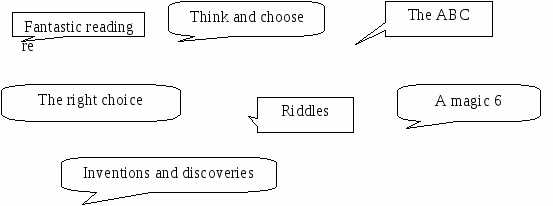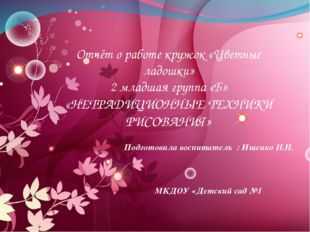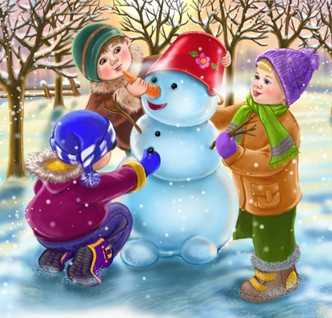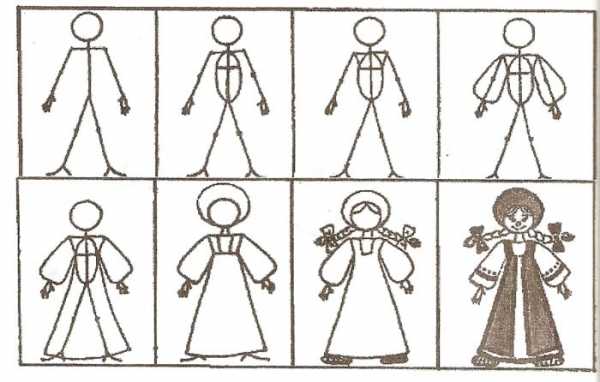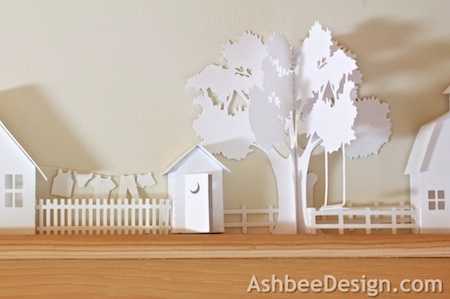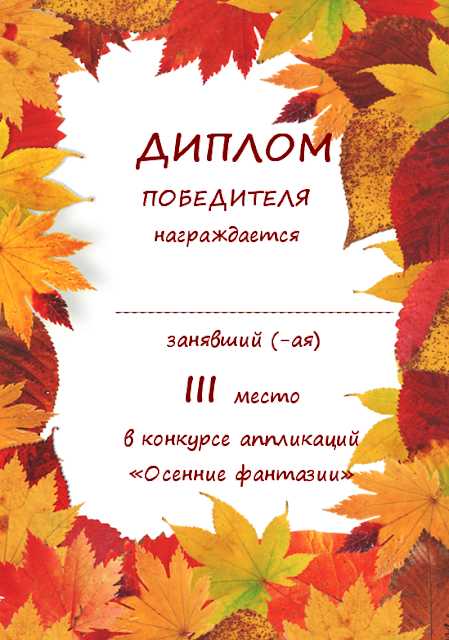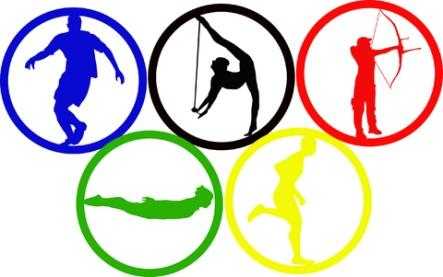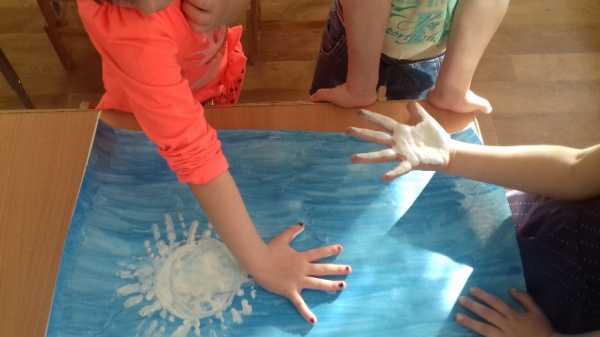Внеклассное мероприятие на тему "Путешествие" 8 класс по английскому языку. Внеклассное мероприятие 8 класс по английскому языку
Внеклассное мероприятие по английскому языку в 8 классе
Внеклассное мероприятие
по английскому языку в 8 классе
Интеллектуальная игра-соревнование
“Knowledge is power”
Цели игры:
1. Развивать неподготовленную речь учащихся.
Развивать творческие способности учащихся.
Повышать мотивацию школьников к изучению предмета.
Обобщить лингвострановедческие знания учащихся, полученные на уроках английского языка.
Образовательные задачи:
Закрепить знания учащихся по изученным темам
Расширить общий кругозор.
Развивающие задачи:
Формировать умение работать в коллективе и принимать совместное решение;
Развивать положительные личностные качества (ответственность, доброжелательность, чувство взаимопомощи).
Развивать и тренировать внимание, память, мышление.
Воспитательные задачи:
1. Воспитывать уважение к культуре своей страны и стран изучаемого языка.
Оформление кабинета:
На доске название игры «Knowledge is power», флаги англоязычных стран, карта СК Великобритании и Северной Ирландии, правила игры, квадрат с цифрами, перечень конкурсов.
Ход занятия.
Оргмомент. Приветствие ведущего.
T: Good morning , children and our guests! I’m very glad to see you here. Today we shall have a competition called “Knowledge is power”. Two teams will take part in our game and you’ll see who is the most quick-witted and the cleverest. It’s time to introduce yourselves. Who is the captain of the 1st team?
T: Who is the captain of the 2nd team?
P: I’m the captain of the team. The name of our team is “Merry kids”. Our motto is “Don’t worry, be happy!”.
(Состав команд, их названия и девиз определяются заранее).
T: I think today all of you have a good chance to improve your English during the game. A competent jury will count your points. The members of our jury are …
Now I’m going to teach you how to play this game. The game has 8 contests, they are:
The ABC game.
A magic 5.
Parts and wholes.
Proverbs and sayings.
Hidden words.
A tongue-twister.
The right choice.
Inventions and discoveries.
Well, I wish you success. Be active, honest and helpful!
Основной этап.
T: The 1st contest of the game is called “The ABC game”. Kids, you’ll get some letters from the English alphabet. In one minute you are to put the letters in the right order, so as to get the name of the English-speaking country. Each team can get 5 points.
(Карточки с буквами: 1. Е, N, G, L, A, N, D. 2. A, M, E, R, I, C, A).
T: And the 2nd contest will start. It is called “A magic 5”. Look at the square, each team will take turns in answering questions. You’ll choose any number. “ …”, it’s your turn to start. Captains will choose the number.
You can get 5 points for the right answer.
1
2
3
4
5
6
7
8
9
10
11
12
Say or sing the English alphabet.
Name 5 colours.
Name 5 sorts of vegetables.
Name 5 school subjects.
You’re lucky! You won a prize!
Name 5 sorts of fruit.
Name 5 winter sports.
Name 5 summer sports.
Name 5 things that people wear.
Name 5 domestic animals.
Name 5 professions.
Name 5 wild animals.
T: The 3rd contest is called “Parts and wholes”. I need 1 pupil from each team. You should combine these parts so as to get a famous place in London. Who will be the first? You can get 1 point for each right answer.
1. Hide Parliament
2.Square Palace
3. National Thames
4. The Tower Gallery
5. St. Paul’s Bridge
6 Tower Abbey
7 Westminster of London
8 Buckingham Cathedral
9 The River Trafalgar
10 The Houses of Park
T: Our next contest is called “Proverbs and sayings”. Each team will get a list of words. You should put the words in the right order so as to make up a proverb. You have 2 minutes at your disposal and can get 3 points for this assignment.
(Обе команды получают одинаковый набор слов, из которых должны получиться 3 английские пословицы).
East or West home is best
Better late than never.
Two heads are better than one.
T: Attention, please! The 5th contest is called “Riddles”. This round is for the captains. Please, answer these questions!
1. What has two arms and four legs? ( An arm-chair)
2. What word is always pronounced wrong? (Wrong)
3. What goes up and down at the same time? (Staircase)
4. What is white when it’s dirty and black when it’s clean?
5. What can fly without wings?6. Some months have 31 days, some have 30 days but how many have 28 days? (They all have)
The second task for the captains. Find, please, names of animals in the sentences.
1. If I shut the door, it will be hot. (Fish)
2. They are going to America today. (Cat)
II.
1. Do geese eat carrots? (Dog)
2. If Roger comes, we’ll begin. (Frog)
T: The following task is for the rest . I invite 1 pupil from each team. You should read the tongue-twister as quickly as you can 3 times.
She sells seashells by the seashore.
2. If a dog chews shoes, whose shoes does he choose?
T: The 7th contest is called “The right choice”. Each team should answer my questions. You’ll get the cards with the letters a, b, c. Choose the right answer and show us the card.
1. The United Kingdom of Great Britain and Northern Ireland consists of:
a) England, Scotland, Ireland, Wales
b) Scotland, Wales, Northern Ireland
c) Wales, England, Scotland, Northern Ireland
2. The capital of England is a) London b) Paris c) Moscow.
3. London stands a) the Volga b) the Mississippi c) the Thames.
4. The symbol of England is a) a red rose b) a tulip c) a daffodil.
5. The English flag is a) blue and white b) red and green c) red and white.
6. Elizabeth II is the Head of...
a) the USA
b) the UK and Canada
c) the UK, Canada and Australia
7. What is the name of the famous London`s clock?
a) "Union Jack".
b) "Big Ben".
c) "London Tower".
8. British money is:
a) pound
b) dollar
c) euro
What is a double-decker? a) a disco b) a bus c) a taxi
10. Ch. Chaplin was a) an artist b) a composer c) an actor.
11.“Robinson Crusoe” was written by a) Lewis Carroll b) Daniel Defoe c) Alan Milne.
12.The traditional Christmas meal in England is a) roast turkey b) fish and chips c) porridge.
Each team can get 1 point for the right answer.
T: One more contest. It’s called “ Inventions and discoveries”. You should answer my questions. The team which answers the first and correctly wins. You can get 1 point for each right answer.
Who invented the telephone? ( Al. Bell)
Who discovered America? ( Ch. Columbus)
Who invented the car? ( H. Ford)
Who created Donald Duck? ( W. Disney)
Who discovered Australia? ( J. Cook)
Who was the 1st man in space? ( Y. Gagarin)
Заключительный этап. Подведение итогов игры
www.metod-kopilka.ru
Внеклассное мероприятие по английскому языку (8 класс)
Описание презентации по отдельным слайдам:
1 слайд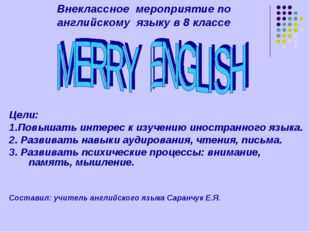
Внеклассное мероприятие по английскому языку в 8 классе Цели: 1.Повышать интерес к изучению иностранного языка. 2. Развивать навыки аудирования, чтения, письма. 3. Развивать психические процессы: внимание, память, мышление. Составил: учитель английского языка Саранчук Е.Я.
2 слайд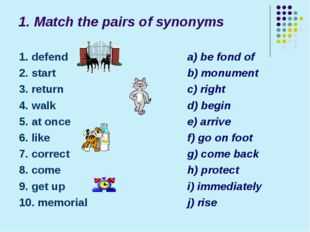 Описание слайда:
Описание слайда: 1. Match the pairs of synonyms 1. defend 2. start 3. return 4. walk 5. at once 6. like 7. correct 8. come 9. get up 10. memorial a) be fond of b) monument c) right d) begin e) arrive f) go on foot g) come back h) protect i) immediately j) rise
3 слайд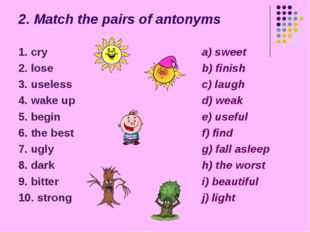 Описание слайда:
Описание слайда: 2. Match the pairs of antonyms 1. cry 2. lose 3. useless 4. wake up 5. begin 6. the best 7. ugly 8. dark 9. bitter 10. strong a) sweet b) finish c) laugh d) weak e) useful f) find g) fall asleep h) the worst i) beautiful j) light
4 слайд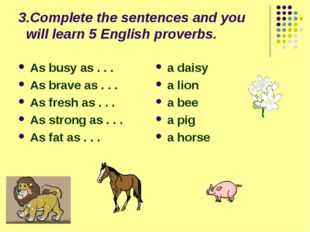 Описание слайда:
Описание слайда: 3.Complete the sentences and you will learn 5 English proverbs. As busy as . . . As brave as . . . As fresh as . . . As strong as . . . As fat as . . . a daisy a lion a bee a pig a horse
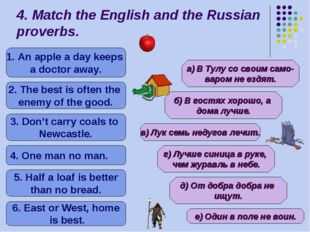 Описание слайда:
Описание слайда: 4. Match the English and the Russian proverbs. An apple a day keeps a doctor away. 2. The best is often the enemy of the good. 3. Don’t carry coals to Newcastle. 4. One man no man. 5. Half a loaf is better than no bread. 6. East or West, home is best. а) В Тулу со своим само- варом не ездят. б) В гостях хорошо, а дома лучше. в) Лук семь недугов лечит. г) Лучше синица в руке, чем журавль в небе. д) От добра добра не ищут. е) Один в поле не воин.
6 слайд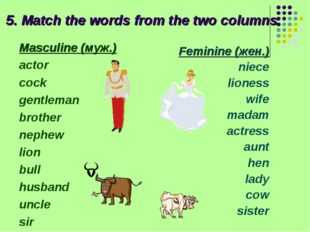 Описание слайда:
Описание слайда: 5. Match the words from the two columns. Masculine (муж.) actor cock gentleman brother nephew lion bull husband uncle sir Feminine (жен.) niece lioness wife madam actress aunt hen lady cow sister
7 слайд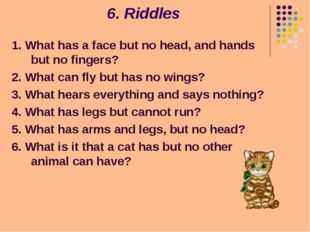 Описание слайда:
Описание слайда: 6. Riddles 1. What has a face but no head, and hands but no fingers? 2. What can fly but has no wings? 3. What hears everything and says nothing? 4. What has legs but cannot run? 5. What has arms and legs, but no head? 6. What is it that a cat has but no other animal can have?
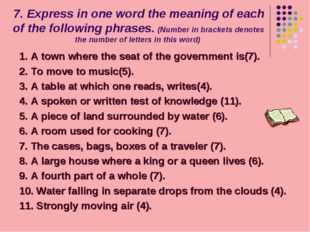 Описание слайда:
Описание слайда: 7. Express in one word the meaning of each of the following phrases. (Number in brackets denotes the number of letters in this word) 1. A town where the seat of the government is(7). 2. To move to music(5). 3. A table at which one reads, writes(4). 4. A spoken or written test of knowledge (11). 5. A piece of land surrounded by water (6). 6. A room used for cooking (7). 7. The cases, bags, boxes of a traveler (7). 8. A large house where a king or a queen lives (6). 9. A fourth part of a whole (7). 10. Water falling in separate drops from the clouds (4). 11. Strongly moving air (4).
9 слайд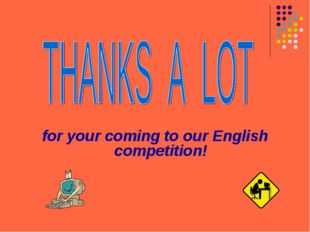 Описание слайда:
Описание слайда: for your coming to our English competition!
Найдите материал к любому уроку,указав свой предмет (категорию), класс, учебник и тему:
Выберите категорию: Все категорииАлгебраАнглийский языкАстрономияБиологияВсемирная историяВсеобщая историяГеографияГеометрияДиректору, завучуДоп. образованиеДошкольное образованиеДругоеДругойЕстествознаниеИЗО, МХКИзобразительное искусствоИностранные языкиИнформатикаИскусствоИспанский языкИсторияИстория РоссииИстория Средних вековИтальянский языкКлассному руководителюКультурологияЛитератураЛитературное чтениеЛогопедияМатематикаМировая художественная культураМузыкаМХКНачальные классыНемецкий языкОБЖОбществознаниеОкружающий мирОсновы безопасности жизнедеятельностиПриродоведениеРелигиоведениеРисованиеРусский языкСоциальному педагогуТехнологияУкраинский языкФизикаФизическая культураФилософияФинский языкФранцузский языкХимияЧерчениеЧтениеШкольному психологуЭкология
Выберите класс: Все классыДошкольники1 класс2 класс3 класс4 класс5 класс6 класс7 класс8 класс9 класс10 класс11 класс
Выберите учебник: Все учебники
Выберите тему: Все темы
также Вы можете выбрать тип материала:
Общая информация
Номер материала: ДВ-052250
Похожие материалы
Оставьте свой комментарийinfourok.ru
| 2 | 3 | 4 | |
| 5 | 6 | 7 | 8 |
| 9 | 10 | 11 | 12 |
doc4web.ru
Внеклассное мероприятие по английскому языку в 8 классе
Просмотр содержимого документа «Внеклассное мероприятие по английскому языку в 8 классе»
Внеклассное мероприятие по английскому языку в 7-8 классах – КВН
Задачи: повышение интереса к изучению иностранного языка; формирование дружелюбного отношения к носителям другого языка; воспитание российской гражданской идентичности; развитие навыков сотрудничества в процессе совместной деятельности.
Начало: Выступление ведущего:
Dear friends! Welcome to our club of merry and quick-witted people. Today we are going to make a trip to Great Britain. I hope our trip will be funny. Let me introduce our teams – the participants of our game:
Class 7a – School stars
Class 7b – Ghosts and witches
Class7c – Happy friends
Class 8a - Sweethearts
Class 8b - Christmas Bells
Let me introduce our judges:
V.V. I. – The Headmaster’s assistant
V.I.M. - a librarian of our school
L.A.G. – The Headmaster’s assistant
A.K. – a pupil of Class 11b
J.S. - a pupil of Class 11A
The 1st task:
You will listen to short texts about sights of London. Try to guess the sight. Don’t forget to raise your signal card.
When the mistress of this building is at home the Royal flag is flying. Every day at 11.30 a.m. they are changing the guard.
( Buckingham Palace).
In the centre of this square there is a statue of the great seaman who defeated the French in 1805.
(Trafalgar Square with the Statue of Admiral Nelson)
There are the tombs of many British kings and queens, other famous people here. It is a royal church.
(Westminster Abbey).
This is the address of the official residence of Prime Minister of the UK.
(NO 10,Downing Street, London).
It was a fortress, a royal palace and later a prison. It is a museum now.
(The Tower of London).
It is a very democratic park. The Speaker’s Corner is situated here.
It is the meeting point of six streets.
(Picadiily Crcus).
It is the seat of the British Government.
(The Houses of Parliament).
It has one of the largest libraries in the world.
(The British Museum).
It is the greatest work of the architect Sir Christopher Wren. It is the second famous church in London.
(St.Paul’ Cathedral).
The second task.
These words are connected with the English language. Do you know them?
Состояние организма, сильное переживание, встряска.
(stress).
Автоматическое устройство для решения очень сложных задач.
(computer)
Тот, кто идет первым в работе, спортивном состязании и т.д. Например, лидер партии.
(Leader).
Это слово появилось в русском языке в конце 19 века. Сначала оно обозначало начало бега лошади на стадионе, а потом стало обозначать начало любых действий.
(Start).
Спортивное состязание.
(match).
Прибор для смешивания сливок, муссов и т.д.
(Mixer).
Испытание, исследование.
( test).
Журналист, доставляющий в газету сведения о фактах и событиях.
(Reporter).
Слово происходит от имени английского лорда, который ввел слово бутерброд в Англии.
( sandwich).
Туман, дым.
(fog).
Массовое собрание для обсуждения политических вопросов, также встреча.
(meeting).
Низкорослая лошадь.
(пони-pony)
Любимое занятие на досуге.
(хобби-hobby).
Лагерь для автотуристов.
(кэмпинг- camping)
Молодые люди, ушедшие из дома и занимающиеся бродяжничеством.
(хиппи - hippie).
Само это слово в английском языке не исконное, оно пришло из итальянского языка. Но в русский язык оно пришло из английского языка в 50 –ых годах 20 века. Это слово обозначает плотную бумажную ткань.
(джинсы -jeans)
Большое место для отдыха, ожидания, обычно в общественных зданиях.
(холл).
Вид автомобильного спорта, соревнование, гонка на автомашинах, а также площадка для таких гонок.
(картинг-carting ).
Спортивный бег или гонки по пересеченной местности.
(кросс- cross).
Задача-головоломка в виде фигуры из пересекающихся рядов клеток, которые надо заполнить словами.
(кроссворд; cross – пересекать, word - слово).
Фильм, во время которого зритель испытывает волнение, трепет, дрожит от страха.
(триллер ; to thrill – вызывать волнение ).
Музыкальный стиль в молодежной моде, что означает удар, легкий звук.
(rap)
Художник – конструктор, специалист по проектированию, оформлению.
(дизайнер).
Средства, искусственно взбадривающие организм и запрещенные спортивными организациями.
(допинг; dope –давать наркотик).
Пишущий краской пористый стержень, заключенный в карандашный патрон.
(фломастер).
Спортсмен или спортивная команда-победитель в соревновании на первенство по какому-либо виду спорта.
(Champion).
Дело, деловое предприятие, торговля, коммерция.
(Business).
Выдумка-ложь с целью создать преувеличенное представление о своих возможностях, хвастовство несуществующими силами и средствами.
(bluff).
Хозяин, глава фирмы (особенно в США)
(boss)
Произведение устного народного творчества.
(folklore).
The third task.( домашнее задание).
Конкурс «Защита проектов». Каждая команда представляет свою газету.
Do you know how English people celebrate holidays?
7A – Easter
7B- Halloween
7C- Birthdays
8A – St. Valentine’s Day
8B – Christmas
The fourth task.
Соревнование капитанов. Конкурс на знание английских пословиц.
A good captain is the flag of the team. Translate the proverbs from English into Russian.
You know a man by his friend. (Скажи мне, кто твой друг, и я скажу, кто ты.)
It is never too late to learn. (Учиться никогда не поздно).
East or West home is best. (В гостях хорошо, а дома лучше).
Every family has a black a sheep. (В семье не без урода).
Appetite comes with eating. (Аппетит приходит во время еды).
Business before pleasure. (Делу время, потехе час).
Don’t count your chickens before they are hatched. (Цыплят по осени считают).
A friend in need is a friend indeed. (Друг познается в беде).
Don’t look a gift horse in the mouth. (Дареному коню в зубы не смотрят).
Everything is good in its season. (Всякому овощу свое время).
He laughs best who laughs last. (Хорошо смеется тот, кто смеется последним).
Live and learn. (Век живи –век учись).
Rome was not built in a day. (Москва не сразу строилась).
There is no smoke without fire. ( Нет дыма без огня).
An hour in the morning is worth two in the evening. (Утро вечера мудренее).
The fifth task.
Соревнование команд.
Competition. Words that begin with Jj. (найти в таблице слова, начинающие с буквы Jj).
Keys: jaguar, Japan, jazz, jeep, jet ski, juice, judge.
Fill in the crosswords.
In my room there is a sofa and a (table).
Books are made of (paper).
I go to (bed) at 10 p.m.
There is an (apple) under the apple-tree.
In winter we like to ski and to (skate).
Fill in the crosswords.
| 1.U | e | |||
| 2 K | n | |||
| 3T | d | |||
| 4G | e | |||
| 5W | r |
My aunt is a doctor and my….
is a worker.
This is a fork and this is a ….
We had English yesterday
and we have it ….
I know red, yellow, blue ….
I don’t like washing with
cold…
Keys: 1.uncle 2. knife 3. today 4.green 5. Water
The sixth task.
Игра со зрителями.
Guess riddles.
This is the season
When days are cool
When we eat apples
And go to school.
(autumn).
My dog likes to run
I like to run too,
My dog has four legs
I have only …
(two).
Doggy, doggy, come to me
Let us play under the ….
(tree).
How many flowers can you see?
Eight in Bobby’s hands
Eight in Nelly’s hands
How many flowers do you see?
(sixteen).
The seventh task.
Do you know Russian holidays?
It is a day when people honour those who took part in the Great Patriotic War.
( Victory Day).
It is a day when people honour working people. It is called the day of spring and work.
(Labour Day).
This holiday is celebrated on the 12th of June.
( The Day of Russia).
It is a religious holiday. People have gatherings eating dyed eggs and other tasty things.
(Easter).
It is a day when men and boys give flowers and presents to women and girls.
(Women’s Day).
It is a day when people have parties and stay up until midnight to see the new year in.
( New Year’s Day).
It is a day when people honour members of the armed forces, a day when girls and women give presents for boys and men.
(Day of Motherland’s defender).
It is a religious holiday when people light candles and give each other gifts. It is celebrated in January.
(Chrismas).
Заключительный этап конкурса. Подведение итогов.
multiurok.ru
Внеклассное мероприятие на тему "Путешествие" 8 класс по английскому языку
Муниципальная средняя общеобразовательная школа №18
Конспект внеклассного мероприятия по английскому языку
Тема занятия:
Путешествие.
( 8 класс)
Шабарина Елена Витальевна
Пояснительная записка к занятию.
Место занятия в учебном плане: тема «Любишь ли ты путешествовать?» ( Цикл 3 УМК “Английский язык” для 8 класса под редакцией В.П.Кузовлева и др.)
Тип занятия: развитие лексических навыков устной и письменной речи.
Цель урока: развитие лексических навыков устной и письменной речи по теме «Путешествие».
Задачи урока:
Дидактические: развивать лексические навыки диалогической и монологической речи, аудирования и письма по теме: «Путешествие».
Развивающие: развивать память, внимание учащихся, их логическое мышление (умение анализировать и систематизировать изучаемый материал), развивать умение работать с интерактивной доской. Расширять знания учащихся о жизни, культуре и традициях народов США, Великобритании и России.
Воспитательные: воспитание чувства гордости за свою страну, толерантного отношения к народам других стран.
Необходимое аппаратное и программное обеспечение:
Компьютер, мультимедийный проектор.
Интерактивная доска.
Изображение 5 цветков (красного, желтого, синего, фиолетового и розового цвета).
Изображение бабочек по количеству учащихся.
Презентация 1.
Презентация 2.
Презентация 3.
Аудиоприложение к УМК Кузовлева В.П. для 8 класса.
Листочки для жеребьевки с надписями: The UK, The USA, Russia, trevelers.
Рисунок с изображением зрительного зала в театре и фигурки человечков.
Ход занятия:
Деятельность учителя
Прогнозируемая деятельность учащихся
1.Цель: формулирование темы занятия учащимися.
-Good morning, students! Today we have an unusual lesson. Take any place you like and solve the crossword together. Then you’ll learn what we are going to speak about (Доброе утро, ребята! Сегодня у нас с вами необычное занятие. Займите любое место и попробуйте решить кроссворд вместе, тогда вы узнаете, о чем мы будем говорить.)
-Good morning.
Учащиеся произвольно рассаживаются в группы и решают кроссворд. Если они выполняют задание правильно, то у них получается слово “travelling”.
(3 мин.)
2. Цель: анализ учащимися уровня своих знаний по теме занятия.
- We all like travelling. Many people help us to travel. We’ll try to be these people today and to prepare for travelling. ( Мы все любим путешествовать. Многие люди помогают нам в этом. Сегодня мы попытаемся побывать на месте этих людей и подготовиться к путешествию.)
- But at first take a butterfly and stick it to the flower which suits your level of knowledge of the topic we studying. (Но сначала возьмите по бабочке и прикрепите ее на тот цветок, который соответствует уровню ваших знаний изучаемой нами темы.)
Учащиеся берут по картинке с изображением бабочки и приклеивают к цветку, анализируя уровень собственных знаний:
желтый - я хорошо знаю тему;
красный – я знаю тему, но хотел бы знать больше;
синий – я плохо знаю, потому что мне трудно;
фиолетовый – я не знаю и знать не хочу;
розовый – мне трудно себя оценить.
(3 мин.)
3. Цель: мотивация учащихся.
–We work today in groups. (Учитель делит учащихся на группы так, чтобы они были приблизительно равными по уровню знания.)
- Dear students, what do you think why we study this topic? Write down as many reasons as you can. You have 2 min. (Дорогие ребята, а зачем мы с вами изучаем такую тему? Запишите как можно больше причин этого за 2 минуты.)
Ребята рассаживаются по группам.
Учащиеся записывают свои причины изучения темы «Путешествие».
(2 мин.)
4. Цель: развитие лексических навыков чтения по теме.
- Before we start travelling we must know what we need for it. Now look at the board, please. Choose the things you need travelling abroad. (Прежде чем отправиться в путешествие, мы должны знать, что нам для этого нужно. Посмотрите на доску, пожалуйста. Выберите вещи, необходимые для путешествия заграницу.)
На доске написаны слова:
a passport, a visa, a rucksack, a map, money, flowers, a sleeping bag, a photo, a camera, a spade, a TV set, a mobile phone, a travel leaflet, a
parachute, a medical insurance.
- Now, group number 2, one of you come to the board, please, and cross off the unnecessary words. (Теперь, группа номер 2, пусть один из вас выйдет к доске и вычеркнет ненужные слова.)
- Let’s see the right variant. (Давайте посмотрим правильный вариант.)
С помощью интерактивной доски учитель выводит правильный вариант ответа.
Учащиеся в группе, глядя на доску, выбирают слова, обозначающие предметы необходимые для поездки заграницу.
Один из учеников из второй группы выходит к доске и вычеркивает слова, обозначающие предметы ненужные для поездки заграницу.
(2 мин.)
5. Цель: развитие лексических навыков чтения.
- Many people like travelling abroad. But it has pros and cons. Look at the board and say what pros and cons are. (Многие любят ездить заграницу. Но в этом есть и свои минусы, и свои плюсы. Посмотрите на доску и скажите в чем они.)
См. приложение (презентация 1)
-Now one person from group 1 will come to the board and mark their variant. (А теперь один член первой группы подойдет к доске и отметит их вариант ответа.)
Один из ребят из первой группы выходит к интерактивной доске и маркером отмечает варианты ответов группы.
(2 мин.)
6. Цель: развитие лексических навыков аудирования.
- Visiting other countries we usually see a lot of interesting things and get much information about these countries. (Посещая другие страны, мы обычно видим много интересного и узнаем много об этих странах.)
- Listen to the conversation of David and travel agent. Try to get as much information as possible. (Послушайте разговор Дэвида с туроператором. Постарайтесь извлечь как можно больше информации.)
Используется аудиоприложение к курсу Unit 3, Lesson 10-11.
- Now use the necessary information to complete the sentences on the board. (Теперь используйте нужную информацию, чтобы дополнить предложения на доске.)
- One student from group 4 come to the board and do the task, please.
Учащиеся слушают запись разговора.
Ребята в группах обдумывают ответ.
Один из членов четвертой группы выходит к доске и выполняет задание.
(5 мин.)
7. Цель: развитие страноведческих навыков.
- Travelling abroad we visit a lot of sights. Do you know where these ones are? (Путешествуя заграницей, мы посещаем много достопримечательностей. Откуда эти?)
На доске появляются виды Великобритании, США и России. ( презентация 2) Учащиеся должны назвать их и страну, где они находятся.
-Come to the board someone from group 3 and do the task. (Кто-нибудь из третьей группы выйдите к доске и выполните задание.)
Ребята в группах обдумывают ответ.
Один из ребят третьей группы выходит и озвучивает решение своей группы.
(5 мин.)
8. Цель: развитие лексических навыков диалогической речи.
-Now you will play different roles. Come here one person from each group. (Сейчас вы будите играть разные роли. Выйдите по одному из каждой команды.)
Учащимся предлагается тянуть жребий. На трех листочках даны названия стран, а на одном написано: «travelers» .
Учитель объясняет, что три команды будут турагентствами и будут предлагать отдых в тех странах, которые у них указаны в листочках. Четвертая же группа будет путешественниками, которые будут посещать эти турагентства. Туроператорам нужно ответить на все вопросы клиентов и постараться убедить их посетить именно их страну. Клиентам же нужно сравнить работу разных агентств и выбрать лучшее.
Из каждой команды выходит по одному игроку и вытаскивает жребий.
Учащиеся четвертой команды делятся на три группы и вступают в диалог с турагентами.
После диалогов они совещаются и выделяют лучшую группу, объясняя, почему они так думают.
(13 мин.)
9. Цель: обобщение лексического материала.
-Look at the board, please. Here you see the pictures. Using them you should make up the story about travelling. (Посмотрите на доску, пожалуйста. Вы видите картинки. Используя их, вам нужно составить рассказ о путешествии.)
См. приложение, презентация 3.
Учащиеся смотрят на картинки презентации и устно составляют рассказ.
(7 мин.)
10. Цель: провести рефлексию занятия.
На доске висит изображение театрального зала: зрительный зал, сцена, кулисы.
- Dear students, analyse your work today. You have a picture with the man’s figure. Stick it on the stage if you’re active, in the auditorium if you’re a spectator, backstage if you’re not interested in the lesson. (Дорогие ребята, проанализируйте свою работу сегодня. У вас есть рисунок с фигуркой человека. Приклейте ее на сцене, если вы были сегодня активны. В зрительном зале, если вы только наблюдатель, за кулисами, если вам вообще сегодня было неинтересно.)
-As for me, I’m satisfied with your work today. Thank you. (А я вполне довольна вашей работой сегодня. Спасибо.)
Учащиеся выходят и каждый приклеивает свою фигурку на изображение зрительного зала.
(3 мин.)
Приложение.
Crossword.
tourist
abroad
train
visa
teenager
infourok.ru
Игровой урок и внеклассное мероприятие по английскому языку для учащихся 8-11 классов
Муниципальное автономное общеобразовательное учреждение
лицей № 1 имени А.С. Пушкина
г. Томска
Методическая разработка игрового урока и внеклассного мероприятия по английскому языку для учащихся 8-11классов
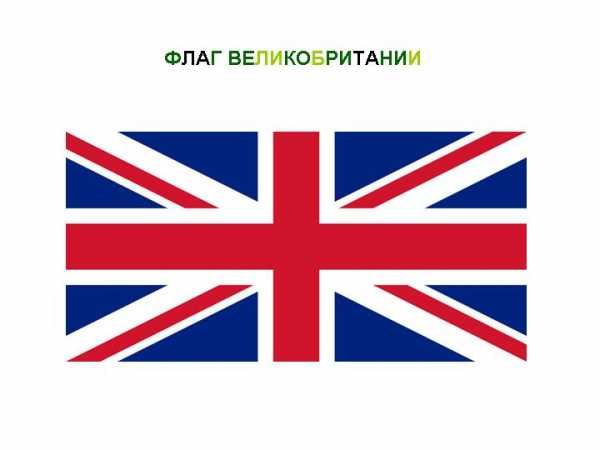
подготовила
учитель английского языка
Ахунзянова Альфия Вагызовна
г. Томск
2014
Цель:
Повышение у учащихся мотивации и интереса к изучению английского языка.
Задачи:
Образовательные – тренировка лексических и грамматических навыков, совершенствование навыков аудирования, актуализация страноведческого материала, расширение кругозора.
Развивающие - развитие познавательной активности, творческих способностей, логического мышления, языковой догадки.
Воспитательные – воспитание уважения к культуре изучаемого языка, формирование дружелюбного отношения друг к другу.
Оборудование: ПК, мультимедийный проектор, экран, презентации Power Point, карточки с заданиями, призы победителям, музыкальное оформление.
Предварительная подготовка
Игра состоит из семи конкурсов, между которыми проводится музыкальная пауза (исполнение песни на английском языке). Для участия в игре ученики заранее делятся на три команды по 5 человек. В каждой команде учащиеся выбирают капитанов, придумывают названия команд, девизы и эмблемы. Выбирается жюри из учеников класса. По окончании каждого конкурса капитаны команд сдают карточки с выполненными заданиями для проверки членам жюри. Жюри подводит промежуточные итоги, а в конце игры объявляется команда-победительница и проводится церемония награждения
Ход мероприятия
Организационный момент
-Good morning, my dear boys and girls!
-I am glad to see you.
-Welcome to our competition “Learning English is Fun”. We have three teams. You will have different tasks. Jury will give you scores. At the end of the competition we shall find out who the winner is. So, let's begin. I wish you good luck! Учитель приветствует учащихся и знакомит их с правилами игры.
II. Конкурс «Представление команд»
Команды по очереди выходят на сцену и представляют свое название, девиз и эмблему. Жюри оценивает данный конкурс по пятибалльной системе.
III.Конкурс «Грамматический брейн-ринг»
You will get the cards with tests. Your task is to choose the correct variant and circle it. You have 3-4 minutes. Задание для участников - обвести кружком правильный вариант ответа. На выполнение задания отводится 3-4 минуты. За первое задание команды получают максимально 10 баллов.
What (are/is) the news?
What (a/-) wonderful weather!
(A/The) woman standing over there is my aunt.
Have you translated the text (already/yet)?
You like love stories (do/don’t) you?
He is tired because he (has/had) been working hard recently?
She told us she (would/will) come.
(Have/had) you cooked the dinner by the time the guests came?
My mother makes me (to do/do) the homework every day.
That sounds (great/ greatly).
Ключи: 1. is; 2.- ; 3. the; 4. yet; 5. don’t; 6. has; 7. would; 8. had; 9. do; 10.great
IV. Конкурс «Викторина» (см. презентация №1)
It’s time to take a quiz. It is interesting to find out if you know about Great Britain and London. You must choose the correct variant. You have ten minutes. Командам предлагается принять участие в страноведческой викторине “What do you know about Great Britain and London. Учитель демонстрирует слайды. Капитаны команд поочередно зачитывают вопросы и три варианта ответов. Задание для участников – выбрать один вариант ответа. На выполнение задания отводится – 10 минут. Максимальный бал за данный конкурс - 25баллов.
Ключи: 2. c; 3. b; 4. a; 5. b; 6. c; 7. b; 8. a; 9.c; 10. c;11. a; 12. b; 13. a; 14. b; 15. c; 16. c; 17. a; 18. b; 19. c; 20. c; 21. c; 22. a; 23.a; 24. a; 25. c; 26. c;
V. Достопримечательности Лондона (см. презентация №2)
You will get the special task. The task for you is to choose the 10 pictures that show the sights of London and name them. You have 5 minutes. Учитель демонстрирует слайды с изображением мировых достопримечательностей.
Задание для команд – выбрать 10 картинок с изображением достопримечательностей Лондона и назвать их. Команды записывают на карточках номер слайда и название достопримечательности. На выполнение задания отводится 5 минут. Максимальный балл -10.
Ключи: 3 –The Houses of Parliament; 6 - The Tower of London; 9 – The British Museum; 11 – Big Ben; 12 – Buckingham Palace; 14 – The London Eye; 16 –Tower Bridge; 17 –St Paul’s Cathedral; 19 – Trafalgar Square; 20 – Westminster Abbey;
VI. Конкурс «Песня»
- Now you will listen to the song and write down the missing words on the cards. You will listen to the song twice. Be careful, please.
Команды получают карточки со словами песни, в которой пропущены некоторые слова. Задание для учащихся – прослушать аудиозапись и записать недостающие слова. Песня прослушивается два раза.
Максимальный балл -10. На данный конкурс отводится 10 минут.
No new year’s day to 1)……….No chocolate covered candy hearts to 2)……..No first of springNo song to singIn fact here's just another 3)……… dayNo April rainNo flowers 4)………No wedding Saturday within the month of JuneBut what it isIs something trueMade up of these 3 words That I must say to you
I just called to say I love youI just called to sayHow much I 5)……I just called to sayI love youAnd I mean it from the bottom of my heart
No summer's highNo warm JulyNo 6)……. moon to light one tender August nightNo autumn 7)………No falling leavesNot even time for birds to fly to southern 8)……No Libra sandNo HalloweenNo giving thanks to all the Christmas 9) …….You BringBut what it isThough old so newTo fill your 10)…….Like no 3 words Could ever do.
I just called to say I love youI just called to sayHow much I …..I just called to sayI love youAnd I mean it from the bottom of my heart
Ключи: 1. celebrate 2. give away 3. ordinary 4. bloom 5. care 6. harvest 7. breeze 8. skies 9. joy 10. heart
Now we have a rest. Let’s sing this song.
Музыкальная пауза – учащиеся исполняют данную песню.
VII. Конкурс «Пословицы»
-I want you to make up the 10 proverbs and translate them. You have 10 minutes.
Учитель предлагает командам составить 10 пословиц и перевести их. Каждая команда получает набор из 20 карточек. На выполнение данного задания отводится 10 минут. Максимальный балл - 20.
Live and learn
Tastes differ
East or West home is best
Tomorrow is a new day
All is not gold that glitters
Better late than never
No pains, no gains
Time is money
There is no smoke without fire
A friend in need is a friend indeed
Век живи - век учись
На вкус и свет товарищей нет (о вкусах не спорят)
В гостях хорошо, а дома лучше
Завтра - новый день
Не все золото, что блестит
Лучше поздно, чем никогда
Без труда не вынешь и рыбку из пруда (любишь кататься, люби и саночки возить, под лежащий камень вода не течет)
Время – деньги
Нет дыма без огня
Друзья познаются в беде
VIII. Конкурс «Кто больше »
It’s time to do the last task of our competition. You will get a long word. The task for you is to make up as many short words of the given one as you can. They may be different parts of speech. You have 5 minutes.
Учитель привлекает внимание учащихся к ключевому слову - sweetheart.
Задание для команд – составить из данного слова как можно больше коротких слов. На выполнение данного задания отводится 10 минут. Команды получают баллы по количеству правильно составленных слов.
IX. Подведение итогов.
- Ok, we have come to the end of our competition. It is interesting to find out what team is the winner today. Congratulations! You’ve done well! Thank you very much for the lesson! Good-bye! Учитель благодарит детей за работу, жюри подводит итоги соревнования и поздравляет победителей.
Список использованной литературы:
1.Дзюина Е. В. Игровые уроки и внеклассные мероприятия на английском языке: 10-11 классы, 2007.
2. Песня “I just called to say I love you” (Stevie Wonder)
doc4web.ru
Разработка внеклассного мероприятия по английскому языку для 7-8 класса Устный журнал по теме "Несколько страничек из жизни англичан"
МИНИСТЕРСТВО ОБРАЗОВАНИЯ РЕСПУБЛИКИ БАШКОРТОСТАН УПРАВЛЕНИЕ ОБРАЗОВАНИЯ АДМИНИСТРАЦИИ МУНИЦИПАЛЬНОГО РАЙОНА ТУЙМАЗИНСКИЙ РАЙОН РЕСПУБЛИКИ БАШКОРТОСТАН
“Some Pages from the Life of the Englishmen.”
(Audio Magazine “What? Where? When?)
(открытое внеклассное мероприятие по английскому языку для учащихся 7-8 класса)
Из опыта работы учителя
английского языка
МБОУ СОШ с. Субханкулово
г. Туймазы
Халиковой Дианы Фаритовны
Туймазы – 2013
Тема: “Some Pages from the Life of the Englishmen.”
(Устный журнал по английскому языку для учащихся 7-8 класса)
Цели:
1. Развитие коммуникативных навыков учащихся.
2. Расширение знаний учащихся о культурных традициях страны изучаемого языка.
Задачи:
1.Познакомить учащихся с особенностями национального характера, некоторых традиций и обычаев британцев ( Британский дом. Британская еда. Отношение к животным.)
2.Освежить в памяти учащихся общие сведения о географическом положении, политическом устройстве, городах Великобритании.
3. Активизировать имеющиеся знания учащихся по теме: «Обычаи и традиции британцев».
4. Учить воспринимать на слух иноязычную речь.
Оборудование: компьютер, экран, видео –сюжеты: “Olney Pancake Race-2007”, «Food in Britain», «Ожирение у животных», ” Homes in Britain”, “An Introduction to Britain”
Познавательный аспект: учащиеся познакомятся с традициями и культурой страны изучаемого языка в рамках тем: «Британский дом», « Британская еда», «Отношение к животным», «День блинов».
Развивающий аспект: целенаправленное развитие психических функций, связанных с речевой деятельностью, таких как внимание, способность к анализу и синтезу, логическое мышление, способность к выявлению языковых закономерностей, языковая догадка, зрительная и слуховая память, фонематический слух.
Учебный аспект: работа, направленная на овладение основными видами речевой деятельности: говорением, аудированием, чтением.
Воспитательный аспект: повышение интереса к изучению английского языка, воспитание культуры языкового общения, уважительного отношения друг к другу, умения внимательно слушать собеседника.
СЦЕНАРИЙ ВНЕКЛАССНОГО МЕРОПРИЯТИЯ ПО АНГЛИЙСКОМУ ЯЗЫКУ ДЛЯ УЧАЩИХСЯ 7-8 КЛАССОВ.
Устный журнал по теме «Some pages from the life of the Englishmen.”
(Звучит фоновая музыка. Участники мероприятия и зрители рассаживаются по местам.)
(На экране проектора появляется название мероприятия, его тема.- Audio Magazine “What? Where? When?” Theme: “ Some pages from the life of the Englishmen.”)
Teacher: Hello, everybody! Welcome to our audio magazine called “What? Where? When?” Join us and you will know a lot about the English character, traditions and customs. (слайд №1)
Teacher: And now look at the screen. Here is our first page. It is called “An Introduction to Britain”. (слайд№2)
(На экране проектора появляется оригинально оформленная первая страница журнала.)
You should not only look at the pictures and listen to the English speech, but understand the countrystudying materials to be ready to make a Quiz.
(Учащиеся смотрят видеофильм “An Introduction to Britain” – 4.45)
Let’s start the Quiz. (Cлайды №3 – 23)
What countries are there in the UK?
What is the population of the UK? (over 58 million)
How many people live in London? (7 million)
Who lives at 10, Downing Street, not far from the Houses of Parliament?
Where does the Queen live?
What British city is the birthplace of William Shakespeare?
What British city was once a big port and the home of the Beatles?
What British cities are famous not only for their universities, but for their bicycles?
How many National parks are there in Great Britain?
10 Is Britain the only one island? (There are more than 800 islands in Britain.)
( Звучит фоновая музыка. )
Teacher: Well done! Thank you. And look at the screen again. The second page of our audio magazine is about the English character. (слайд№24)
The English character
Englishmen are naturally polite and are never tired of saying “Thank you” and “I’m sorry”. They are very disciplined, you never hear loud talk in the street. They do not rush for seats in buses and trains, but they take their seats in queues at bus stops. They will never shut the door in your face but will hold it open for you.
English people do not shake hands when meeting one another, they just smile and say, “Hello!” They say “How do you do” sometimes, but not very often. Only to people they meet for the first time.
When two Englishmen meet they often begin their conversation talking about the weather. They do this because they do not know each other well enough to talk about personal matters; they may not wish to talk about politics until they know each other better, so they are glad to have a topic about which they cannot quarrel with each other. When they go abroad Englishmen often surprise people of other nations by this tendency to talk about the weather, a topic of conversation that other people do not find so interesting.
(Выступление учащихся сопровождается слайд-шоу)
Teacher: Our third page is called “My home is my castle” (слайд №25)
My home is my castle.
The Englishman says “My house is my castle”, because he doesn’t wish his doings to be overlooked by his neighbours. («Мой дом – моя крепость», потому что он (англичанин) не хочет, чтобы его соседи были осведомлены о его делах.)
It’s a tradition with English people to have fireplaces in their houses. (слайд №26)
They are usually made of stone in the wall of a room and with a chimney in the roof.
The fireplace is the natural centre of interest in the room. People like to sit at a window on a summer day, but for many month of the year they like to sit round the fire and watch the dancing flames. In the evening when members of the family come home, they like to gather round the fireplace and exchange the day’s experience.
(слайд №27) Nowadays many fireplaces are modernized, they are gas or electric fireplaces.
(Выступление учащихся сопровождается слайд-шоу)
Teacher: And now some more details about English home together with Leonie Dodd. Look and listen attentively, please.
(Просмотр видеосюжета ” Homes in Britain” – 5.27 )
Teacher: As Leonie has told, the Englishman are keen on their gardens and pets. Our fourth page is devoted to the Englishmen and their hobbies such as gardening and keeping pets.
(слайд№28)
The English and their flora and fauna
Most English love gardens, and this is probably one reason why so many people wish to live in houses more than flats. They want to have a bit of land where they could plant something: tomatoes, potatoes, cucumbers, cabbage, or grow flowers. They love flowers very much. If you want to please an Englishman (or Englishwoman) be very polite about his (her) garden.
(слайд№29) The English people like animals very much. Pet dogs, cats, horses, ducks, chickens and other friends of man have a much better life in Britain than anywhere else. In Britain they have special dog shops selling food, clothes and other things for dogs. There are dog hair-dressing saloons and dog cemeteries. (парикмахерские и кладбища для собак)
(слайд№30) The English arrange dogs’ shows and organize dogs’ supper parties for winners of dogs’ competitions. They do all they can to make animals feel well in their homes, and outside their homes too. There were photographs in English newspapers of a mother-duck and her young family crossing slowly the road from Hyde Park lake to the waters of Kensington Gardens. All traffic around was stopped to let Mamma Duck and her little ones walk quietly from one park to another.
(Слайд№31) In recent years The English began to show love for more “exotic” animals such as crocodiles, elephants, tigers, cobras, camels.
(Выступление учащихся сопровождается слайдами).
Teacher: There are about 4 million dogs, 6 million cats, 8 million caged birds and a lot of other animals in Britain. The English people believe that they are only nation on the earth that is really kind to its animals. But most of the Englishmen are very busy like many other people in the world, that’s why sometimes they have some problems with their animals. The next video is about it.
(Просмотр видеосюжета «Ожирение у животных» - 6.05).
Teacher: You see how dangerous can be incorrect eating not only for people but for their animals. Our next page is “English Food”. (слайд № 32).
ENGLISH FOOD
The English take four meals a day: breakfast, lunch, tea, and dinner or supper.
In England breakfast time is between seven and nine; lunch time is between twelve and two, tea is between four and four and a half and dinner or supper time is between seven and ten.
Many English working-class families eat dinner in the daytime and the third and last meal they have between five and seven. It’s tea or supper.
(слайд №33) The Englishman likes a good breakfast. To him a good breakfast means porridge with milk, fish, bacon and eggs, toast and marmalade, tea or coffee. And to him much of its goodness lies in the fact that it is the same from day to day, from January to January.
(слайд №34) The English like their toast cold. It is cut in triangles and set in the partitions on an open toast rack. (Он (гренок) режется в форме треугольника и подается на подставке)
(слайд №35) For lunch they usually have soup, fruit juice, cold meat and salad, or fish. Or roast meat and vegetables, then goes an apple tart, or a hot milk pudding, cold fruit salad, or ice-cream.
(слайд №36) From four to six there is a very light meal called afternoon tea. It consists of a cup of tea and a cake. This became a kind of ritual. At this time “everything stops for tea” in England. The whole nation is at ease drinking tea.
(слайд №37) Dinner (usually at 6 p.m.) is much like lunch and is in many families the last main meal of the day. For supper they have tea or coffee with biscuits. Almost every meal finishes with coffee, cheese and butter.
(слайд №38) Coffee is weak by European standards. Most English people put milk in their coffee – this is known as “white” coffee. Waiters will ask if you want your coffee “black or white” rather than “with or without” milk.
(слайд №39) This is what the magazine MODERN ENGLISH writes about English food:
“The English are not interested in food. Their food is standardised, and, in general, rather dull and unimaginative. (однообразна и прозаична) – без выдумки). Take, for example, the way of cooking vegetables. The English housewife simply boils them in salt water. But now many British housewives do not even find time to boil fresh vegetables. They leave their homes and kitchens to go and work. They are not ashamed to use frozen, convenience food – simply because it saves time.”
And some more about English tea.
(слайд №40) English people are tea-drinkers. They love tea. They have it many times a day.
If you come to an English home even at five o’clock in the morning, you’ll get a cup of tea.
Then you have tea for breakfast; then you have tea at 11o’clock in the morning for lunch; then you have tea after lunch; then you have tea for tea; then after supper; and again at 11 o’clock at night.
(Выступление учащихся сопровождается слайд-шоу)
Teacher: And now some more details about English food with Leonie Dodd.
(Просмотр видеосюжета «Food in Britain» – 4.34)
Teacher: You know how many interesting traditions the Englishmen have. You have already read about such public holidays as Christmas Day, Boxing Day, New Year’s Day, Easter, May Day, Boxing Day. And today we’ll tell you about Pancake Day. (слайд №41)
Pancake Day
Pancake Day is a gay and tasty holiday with the English. It is usually in March. Do people eat pancakes! They have pancakes not only at home, but at school as well.
But they do not only eat pancakes, they run with them!
In some villages and towns in England pancake races take place every year. These races are run by housewives. There are special rules about pancake races: housewives must wear aprons, they must put on hats or scarves on their heads. They must run about 415 yards (410 metres).
A bell rings twice before the race. With the first bell the women must make their pancakes. With the second bell they start running with a pancake in a frying-pan. While running the race, they must toss the pancake three times and catch it back on the frying-pan. If the pancake falls down, the runner may pick it up and toss again.
The other members of the families watch the runners and cheer: “Run, Mum, run, run quickly!”
Teacher: And now look at the screen. There is an interesting video about this funny holiday.
(Просмотр видео “Olney Pancake Race-2007”)
Teacher: There are many other interesting traditions and customs in Britain, but the time of
our audio magazine “What? Where? When?” is almost over. We have some minutes to get to know how much interesting information you have known about Great Britain. Let’s have a quiz.
Listen to the question, put your hand up and only then answer the question. Let’s start.
QUIZ: (слайд№42)
What is the English character? Are they polite? Do they shake hands when meeting one another? (Englishmen are naturally polite and never tired of saying “Thank you” and “I’m sorry”. They are very disciplined.)
Why do Englishmen often talk about the weather? ( They do this because they do not know each other well enough to talk about personal matters.)
What thing is the natural centre of interest in the room of most English houses? (It’s a fireplace.)
What are the most popular English hobbies? (They are gardening and keeping pets.)
(слайд №43)
When is the time for breakfast in England? (It’s between 7 and 9.)
What do English people eat for breakfast? ( They usually eat porridge with milk, fish, bacon and eggs, toast and marmalade, tea or coffee.)
What do they eat for lunch? (They eat soup,fruit juice, cold meat and salad, or fish. Or roast meat and vegetables, a hot milk pudding, cold fruit salad, or ice-cream.)
What time is afternoon tea? (It’s from 4 to 6. There is a very light meal called afternoon tea.)
(слайд №44)
What is “white” coffee? ( It’s coffee with milk.)
What drink do Englishmen prefer best of all? (They prefer tea.)
What people do on Pancake Day? (They eat pancakes and take part in pancake races.)
Who must toss the pancake three times and catch it back on the frying-pan? (The housewives)
(Начинает звучать фоновая музыка. )
Teacher: Well, our quiz is over. I’d like to thank my assistants for their help in preparing the audio magazine. And of course, thank all of you for your attention and good knowledge of English. These applauds are for you.
Goodbye! See you later.
(Фоновая музыка усиливается. )
multiurok.ru






